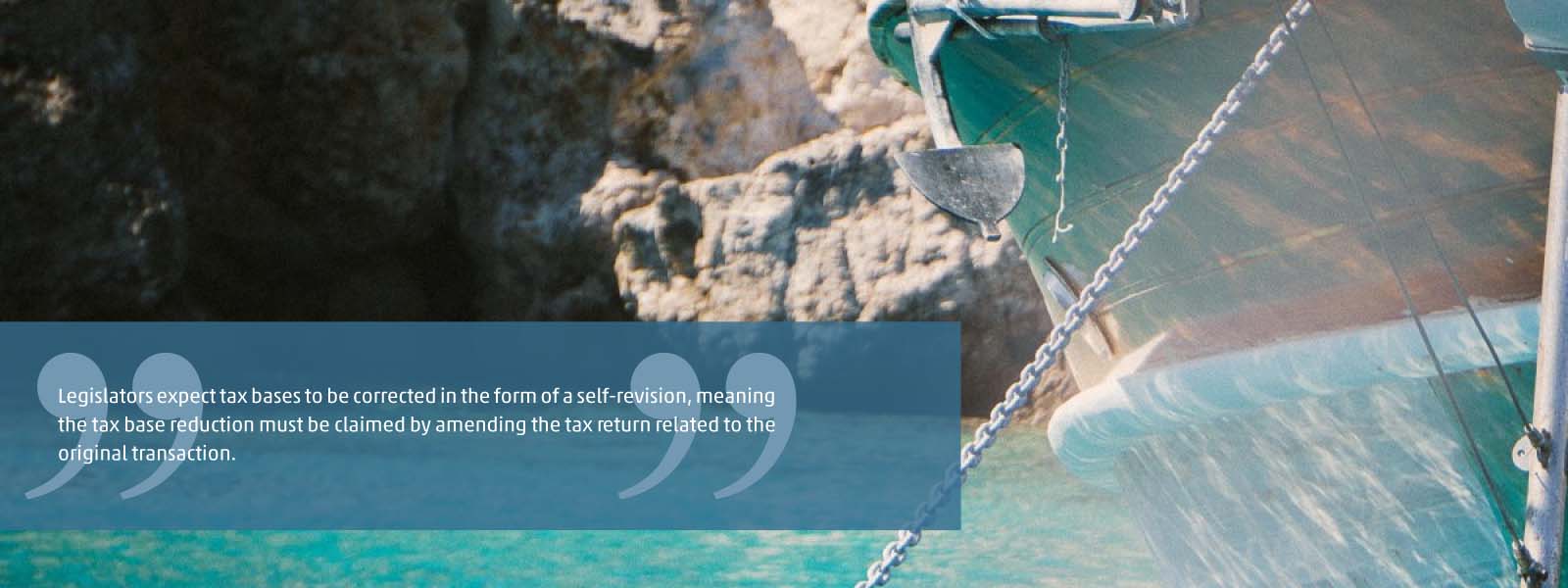The majority of businesses have most probably already encountered a situation where one of their customers could not pay, therefore their receivable turned into an irrecoverable debt. In this article we take a look at the new rules pursuant to the Hungarian VAT Act for reclaiming VAT on irrecoverable debts, effective from 1 January 2020.
The business entity in our example acquires raw materials for its production then sells the finished goods as a wholesale trader to various retail networks. The company can deduct VAT in its tax returns on its purchases subject to VAT (this is commonly referred to as deductible VAT), while it has to determine and declare the VAT on its sales as tax payable. The entity actually has to pay any positive difference between the tax payable and the tax deductible to the state coffers depending on the regularity of the returns (generally monthly or quarterly), and if the deductible tax exceeds the tax payable, it can be reclaimed. Let’s take a look at what issues may arise with such a procedure.
Is it possible that my customer still has not paid me, but I already have to pay the related VAT to the state?
Of course it is. Suppose you dispatch a domestic supply to a Hungarian customer on the last day of June, so according to the general rule, the performance date of this sale on the invoice is 30 June. The VAT return on the transaction in June must be prepared and the related VAT paid in by 20 July. If you agreed on payment terms with the customer of more than 20 days, then it can happen that the payment for the supply (including the related VAT) does not arrive on your bank account by the time you have to pay in the related VAT to the state. Naturally, most businesses anticipate such conditions and always structure their cash flow position in such a way as to be able to bridge these periods.
What can I do if my customer does not pay for a lengthy period, becomes insolvent or, in a worst-case scenario, goes into liquidation?
According to the new rules regarding VAT on irrecoverable debts effective as of 1 January 2020, in such cases it is now finally possible to reclaim the VAT of your customer’s unpaid consideration under certain conditions. A number of EU countries have already dealt with the issue of VAT related to irrecoverable debts in their national VAT rules, and in 2020 Hungary is now catching up.
What exactly are irrecoverable debts?
The Hungarian VAT Act introduced a new definition based on which the following receivables are considered irrecoverable debts:
A) Receivables generated through supplies of products or services, consideration amounts or parts thereof including VAT accounted for as receivables, which are recorded as receivables in the taxpayer’s records.
B) A receivable is considered an irrecoverable debt for one of the following reasons:
- there are no funds for payment as identified during enforcement proceedings against the debtor, or the funds are insufficient,
- the receivable was cancelled by the creditor during bankruptcy or liquidation proceedings or during a debt consolidation with local governments,
- there are no funds for the receivable according to the written declaration (statement) issued by the liquidator, provided that at least two years have elapsed since the start of the liquidation,
- the receivable is not covered by the asset(s) received at a value specified in the proposal for the distribution of assets upon conclusion of the liquidation or debt consolidation procedure.
Under what conditions can the tax base be reduced?
It was already included in the summer tax law amendments that in Hungary, according to the new rules, you need to satisfy a number of conditions at the same time to be able to deduct the VAT of irrecoverable debts from your tax base. These conditions are the following:
- you must comply with the principle of the proper exercise of law;
- the transaction must be conducted among independent parties;
- the customer must be previously notified in writing unless it was terminated without succession;
- the taxpayer must not be under bankruptcy, liquidation or involuntary deregistration proceedings at the submission date of the tax return related to the irrecoverable debt;
- the customer must not be under bankruptcy, liquidation or involuntary deregistration proceedings at the performance date of the product or service supply resulting in a receivable recognised as irrecoverable debt;
- the customer must not be listed in the database for taxpayers with a considerable tax shortfall or large tax debt at the time of the original transaction and the year before that, which can be queried from the Hungarian tax authority’s website;
- the customer’s tax number has not been cancelled as of the performance date of the original transaction;
- the Hungarian Tax and Customs Administration did not provide information for the taxpayer by the performance date of the original transaction on the customer’s evasion of its tax liabilities;
- at least one year has elapsed since the payment due date for the consideration of the original transaction;
- the consideration for the original transaction was not or cannot be recovered in another way; and
- the performance date of the original transaction falls after 31 December 2015.
What does the written notification sent to the customer have to contain?
Pursuant to the legislation, the preliminary written notification must include at least the following information:
- the reason for recording the receivable as an irrecoverable debt;
- the invoice number related to the original transaction;
- the amount of irrecoverable debt (consideration or part thereof, and the breakdown of the related taxes); and
- a statement on the taxpayer subsequently deducting the amount of the consideration designated above, excluding VAT, from its tax base.
How do you need to declare the tax base reduction?
The reasoning for the new rule regarding the VAT on irrecoverable debts clearly states that the legislators expect tax bases to be corrected in the form of a self-revision, meaning the tax base reduction must be claimed by amending the tax return related to the original transaction. The taxpayer must attach a statement to the tax return on the reason for recognising the receivable as an irrecoverable debt, the number of the related invoices, the amount deductible for tax purposes, the name and tax number of the customer, and a statement on the fact that the consideration for the original transaction was not and cannot be recovered in another way.
What should you do if the customer pays the debt after lowering the tax base?
In this case your tax return must be corrected and you have to make a statement on the recovered consideration excluding VAT as well as on the name and tax number of the paying customer.
During value-added-tax consultations the tax advisers of WTS Klient Hungary help their clients navigate in the maze of the 2020 VAT amendments, they answer questions on the applicability of the new VAT rules at the clients’ companies, and help them find solutions for the new challenges. Feel free to contact our colleagues if you need help or have questions with regard to reclaiming VAT on irrecoverable debts.











